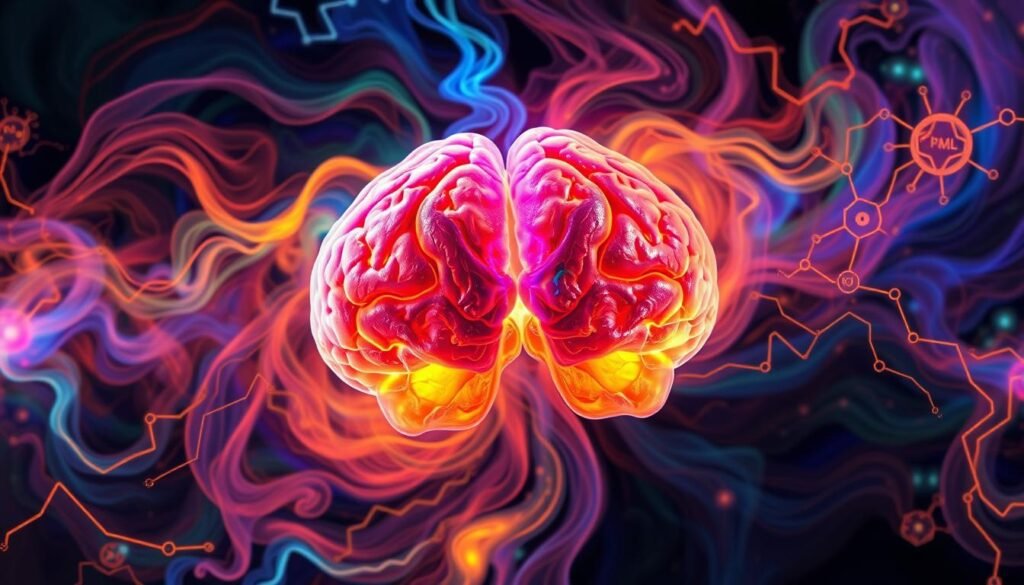The term “adrenal fatigue” is getting more popular. But, it’s not officially recognized as a medical condition. It covers vague symptoms like being tired, feeling weak, and wanting sugar and salt. The Causes of Adrenal Fatigue are mostly linked to long-term stress. This stress affects our adrenal glands. These glands are important for making hormones. The term has caused a lot of confusion and people want clear answers.
Adrenal insufficiency, including Addison’s disease, is officially recognized. Unlike adrenal fatigue, it’s known for not making enough hormones. Adrenal fatigue is often talked about outside of standard medicine. People debate whether its symptoms are real. These symptoms can be similar to depression or sleep apnea. There are no special tests for adrenal fatigue. Usually, hormone levels in blood tests appear normal. If symptoms keep bothering you, it’s key to talk to doctors. The Mayo Clinic suggests this too.
Key Takeaways
- Adrenal fatigue is not recognized as a medical diagnosis.
- Adrenal insufficiency is a serious, diagnosable condition.
- Common symptoms of adrenal fatigue include tiredness and cravings for salt and sugar.
- There are no specific tests for diagnosing adrenal fatigue.
- Consulting healthcare professionals is crucial for persistent symptoms.
- Understanding the causes of adrenal fatigue can lead to better management of symptoms.
What is Adrenal Fatigue?
Adrenal fatigue is a popular term in alternative healthcare. It describes a state of tiredness due to long-term stress. Symptoms often mentioned include chronic fatigue and cravings for sugary or salty foods. Symptoms of adrenal fatigue also involve difficulty concentrating. However, this term is not recognized by scientists or doctors. Medical experts see it as a general label for various nonspecific symptoms.
Many believe chronic stress overworks the adrenal glands. The definition of adrenal fatigue talks about reduced hormone production. Yet, it’s important to not confuse it with adrenal insufficiency. Adrenal insufficiency is a real health condition where the adrenal glands don’t make enough hormones. This can happen because of surgery or certain illnesses.
Tests for adrenal fatigue often show no hormone imbalances. This skepticism among doctors is widespread. People focusing on adrenal fatigue might overlook real health issues. It’s key to get a proper medical diagnosis for your symptoms instead of relying on uncertain terms.
Understanding health terminology well is crucial. If you’re experiencing symptoms, consulting a healthcare professional is the best step. They can correctly diagnose and treat the problem, addressing any serious symptoms with the right medical care.
| Symptoms of Adrenal Fatigue | Symptoms of Adrenal Insufficiency |
|---|---|
| Tiredness | Extreme fatigue |
| Difficulties concentrating | Body aches |
| Cravings for sweet or salty foods | Loss of appetite |
| Sleep problems | Weight loss |
| Low sex drive | Low blood pressure |
| Dizziness | Nausea and lightheadedness |
The Role of Adrenal Glands in Stress Response
The adrenal glands are key in the body’s stress response. They make important hormones like cortisol and adrenaline. These prepare the body to either fight or flee when stressed. When we’re stressed, these glands work extra hard. They release hormones that help us stay alert, make our hearts beat faster, and give us more energy.
But when stress doesn’t stop, it’s hard on the adrenal glands. They struggle to keep up with making enough hormones. Over time, they might not work as well. This can lead to health problems. Making too much cortisol for too long can hurt our health in many ways.
Knowing how the adrenal glands respond to stress helps us understand stress and health. If the glands make too few hormones, it can lead to adrenal insufficiency. Making too many hormones can cause issues like Cushing’s syndrome. The adrenal glands help control metabolism, the immune system, and blood pressure.
In short, the adrenal glands are crucial for dealing with stress. If the hormones they make are out of balance, it can cause big health issues. That’s why it’s key to know ways to manage stress. This helps keep the adrenal glands working right.
| Hormone | Function |
|---|---|
| Cortisol | Regulates metabolism, immune response, and blood pressure |
| Aldosterone | Controls blood pressure and sodium/potassium levels |
| Epinephrine (Adrenaline) | Increases heart rate and energy availability during stress |
| Norepinephrine (Noradrenaline) | Enhances alertness and blood flow during stress |
Causes of Adrenal Fatigue
Let’s look into why adrenal fatigue happens. Chronic stress is a big reason that affects our adrenal glands. It leads to noticeable symptoms. So, managing stress is key for healthy adrenal glands.
Chronic Stress and Its Impact
Chronic stress messes with our adrenal function. It fires up the hypothalamic-pituitary-adrenal (HPA) axis, making us produce more stress hormones. With time, our bodies can’t keep up, leading to tiredness, anxiety, and no drive to do things.
Poor Diet and Nutritional Deficiencies
Eating poorly can lead to not getting enough of the right nutrients. Not having enough vitamins and minerals, like Vitamin C, B vitamins, and magnesium, is bad. Our bodies struggle to make important hormones. Eating well is crucial for energy and feeling good, especially if you’re dealing with adrenal fatigue.
Lack of Sleep and Sleep Disruption
Not sleeping enough is a big deal for adrenal fatigue. Sleep problems make our cortisol levels go up, making us feel more stressed. Without enough rest, our bodies can’t bounce back. This keeps us feeling run down. Better sleep habits help fix our adrenal function and boost our energy.
Hormonal Imbalances and Adrenal Function
Understanding how hormonal imbalances and adrenal function are linked is key. This is especially true for those feeling unusually tired or seeing shifts in their energy. Factors like stress and lifestyle choices can change hormones. These changes can upset adrenal function, impacting your well-being.
How Hormonal Changes Affect Energy Levels
When hormones are out of balance, your energy can greatly change. Stress makes hormones like cortisol swing, affecting energy creation and use. This might lead to feeling tired even after good sleep. It shows the strong link between hormones and adrenal function.
Impact of Menstrual Cycle and Menopause
The menstrual cycle causes natural hormone changes, making many women feel more tired. At this time, body’s energy can fall, stressing the adrenal glands. Then, menopause brings more hormone changes. This can cause more tiredness and mood swings. Both phases put extra stress on the adrenal glands. They impact the body’s overall health.

| Condition | Effect on Adrenal Function | Symptoms |
|---|---|---|
| Menstrual Cycle | Hormonal fluctuations can stress adrenal glands | Fatigue, mood swings |
| Menopause | Increased stress on adrenal function due to hormone shifts | Heightened fatigue, emotional fluctuations |
| Hormonal Imbalances | Disruption in energy production and usage | Fatigue, lack of motivation |
Toxin Exposure and Its Effects on Adrenal Glands
Exposure to environmental toxins can harm your adrenal health. Knowing the types of toxins in everyday life helps manage exposure. Toxic metals like cadmium, lead, mercury, nickel, and aluminum harm the adrenal glands.
Common Environmental Toxins
Many toxins in the environment hurt the adrenal glands. This can cause hormone imbalances. The table below shows how specific metals affect adrenal health:
| Toxin | Effects on Adrenal Glands |
|---|---|
| Cadmium | Accumulation affects cortisol production and damages the hypothalamus. |
| Lead | Impairs basal cortisol levels; contributes to a diminished stress response. |
| Mercury | Blunted morning cortisol response; may alter adrenal structure and function. |
| Nickel | Associated with reduced cortisol production. |
| Aluminum | Links to decreased cortisol output. |
Toxins cause physiological harm through various methods. They increase oxidative stress and change hormone metabolism. This disrupts adrenal function, potentially leading to adrenal fatigue symptoms.
Managing Toxin Exposure
Managing your exposure to toxins is key for adrenal health. Here are some ways to reduce toxin contact:
- Choose organic food to avoid pesticides.
- Use non-toxic products at home.
- Detox regularly with plenty of water and a healthy diet.
- Stay informed about environmental hazards and avoid them.
- Exercise regularly to help your body detox.
Understanding toxin effects on adrenal glands helps you stay healthy. By reducing exposure, you improve adrenal function.
Infections and Their Role in Adrenal Fatigue
Viral and bacterial infections play a big role in adrenal fatigue. They put stress on the immune response. This makes the adrenal glands work hard to keep up with hormone production. This tough cycle causes more weakness and lowers energy.
How Viral and Bacterial Infections Can Contribute
Infections cause inflammation that affects adrenal health. Autoimmune diseases often play a part in this problem, especially in developed countries. But in less developed places, infections are the main reason for Addison’s disease.
The table below shows how infections impact adrenal health:
| Infection | Impact on Adrenal Glands | Stats |
|---|---|---|
| Mycobacterium tuberculosis | Common causative agent of adrenal infections. | 85-90% involvement in adrenal infection cases. |
| Paracoccidioides brasiliensis | Causes adrenal destruction through embolic infection. | 85-90% of infections affect adrenal glands. |
| Nocardia asteroides | Increased risk due to hypercortisolism. | Associated with various pathogens. |
| Neisseria meningitidis | Can lead to Waterhouse–Friderichsen syndrome. | Characterized by acute adrenal insufficiency. |
Long-term infections can make the HPA axis produce more cortisol. Too much cortisol increases infection risk. It makes adrenal fatigue worse. Symptoms like tiredness, weakness, and dizziness highlight the need to tackle both infections and their effect on the adrenals.

The Effects of Prolonged Insomnia
Prolonged insomnia harms your health, especially your adrenal glands. When you don’t sleep enough, it messes up your sleep routine. It also changes how your body makes hormones, like cortisol. Cortisol is key in handling stress, and not making it right can cause more problems. This can make you feel more tired and emotionally unstable.
Long-term sleep issues can lead to more than just feeling sleepy. You may hurt more easily, feel moodier, and think less clearly. Research shows important body functions, like growth hormone release, happen during sleep. This shows how vital good sleep is. Also, being comfortable, in a room between 60-68 degrees Fahrenheit, helps you sleep better.
People with adrenal fatigue often wake up at night. This ruins their sleep quality. To help fix this, it’s good to eat foods that make your hormones more balanced. Getting your hormones and brain chemicals right takes time, but it’s key for getting better both physically and mentally.
Not sleeping enough makes you feel drained because of all the stress. Healing from bad sleep and adrenal fatigue brings back your energy and wellness. Getting the right help can greatly improve how your adrenals work and how well you sleep.
Want to know more about how lack of sleep affects adrenal fatigue? Check out this informative page.
| Aspect | Effect of Prolonged Insomnia | Impact on Adrenal Function |
|---|---|---|
| Hormone Production | Disrupted cortisol levels | Increased stress response impairment |
| Sleep Cycle | Interrupted sleep patterns | Potential awakening for bathroom use |
| Pain Sensitivity | Heightened sensitivity to discomfort | Increased emotional distress |
| Recovery Duration | Varies based on severity | Commitment to lifestyle changes needed |
| Environmental Factors | Temperature influences quality | Ideal range: 60-68°F |
Overexercising: A Hidden Cause of Fatigue
Overexercising is a hidden cause of feeling tired and stressed from exercise. While regular exercise is crucial for health, too much can stress your body. This can mess up your hormones and make you feel more tired. It’s important for athletes and exercise lovers to be careful with how much they train.
The adrenal glands help handle stress and make key hormones. If you exercise too much, these glands can get worn out. Knowing when you’re overdoing it is key. Signs include feeling very tired, trouble getting up, and not thinking clearly. Some might feel sick often or really want salty or sugary snacks.
To keep from getting too tired, mix rest, good food, and calmness with your workouts. Eating lots of whole foods, proteins, and good fats helps your body. Cutting back on caffeine and sugar can also balance your stress hormone levels. Getting 7-9 hours of sleep helps heal your stress response system.
It’s vital to notice how your body reacts to exercise. Too much can make it hard for your body to bounce back, leading to issues like Overtraining Syndrome. This problem makes your adrenal glands weak. If exercise tires you out too much, getting advice and changing your routine helps. Reading up on how to manage exhaustion, like in this article, offers good tips.

Genetic Factors Influencing Adrenal Health
Genetic factors play a big role in adrenal health. Conditions like congenital adrenal hyperplasia (CAH) affect about 1 in 18,000 babies. This shows how inherited conditions can lead to adrenal health problems. For a child to have CAH, both parents need to carry the mutated gene.
Also, conditions such as X-linked Adrenal Hypoplasia Congenita (AHC) show genetics’ impact on adrenal performance. Over 300 families have been reported with AHC because of the NR0B1/DAX-1 gene. Among men, late-onset forms of AHC have started to appear, showing that inherited conditions can show up later.
There is a wide range in how adrenal conditions can vary due to the NR5A1 gene. Over 250 cases have been reported showing different health outcomes from mutations in this gene. These can include severe hypospadias or male infertility, showing a wide array of symptoms due to genetics.
For those with a family history of adrenal problems, understanding these genetic factors is key. This knowledge can help in managing lifestyle and stress that might worsen adrenal fatigue. Genetic counseling can offer important insights to those at risk, helping them be aware of potential health issues.
| Condition | Inheritance Pattern | Prevalence | Key Symptoms |
|---|---|---|---|
| Congenital Adrenal Hyperplasia (CAH) | Autosomal Recessive | 1 in 18,000 infants | Adrenal crisis, hormonal imbalances |
| X-linked AHC | X-Linked | Over 300 families reported | Adrenal insufficiency, metabolic disruption |
| NR5A1 Mutations | Autosomal Dominant | More than 250 cases | Severe hypospadias, infertility |
Recognizing Symptoms of Adrenal Fatigue
It’s key to know the symptoms of adrenal fatigue to spot potential health issues. Although not widely recognized by doctors, it’s something people report feeling. These symptoms can be important to notice.
Common Symptoms to Look Out For
Here are some signs of what some call adrenal fatigue:
- Chronic tiredness
- Weakness
- Sleep disturbances
- Cravings for sugar and salt
- Mood swings
These signs could also mean other health problems. Adrenal insufficiency is something different. It has serious symptoms like really bad fatigue, body aches, and losing a lot of weight. It’s crucial not to mix them up to avoid wrong treatment.
When to Consult a Healthcare Professional
If you’re always tired for no clear reason, see a healthcare professional. They can check if something else is going on, like thyroid issues. You might need tests to check your hormones. Talking to a doctor can help you figure out how to get better.
| Symptom | Description |
|---|---|
| Chronic Tiredness | Persistent fatigue that does not improve with rest. |
| Weakness | Feelings of physical weakness or lack of strength. |
| Sleep Disturbances | Problems with falling asleep or staying asleep. |
| Cravings for Sugar and Salt | Intense desire for sugary or salty foods, indicating potential hormonal imbalances. |
| Mood Swings | Frequent emotional fluctuations or irritability. |
Conclusion
It’s vital to know what causes adrenal fatigue for good health management. The term “adrenal fatigue” was first used by James L. Wilson in 1998. Even though some people debate it, the symptoms greatly affect life quality.
Fatigue, not being able to sleep, and needing caffeine are key signs. If ignored, they can lead to anxiety and depression. This makes it even more important to deal with them.
It helps to know what leads to these issues, like too much stress, bad eating habits, and not sleeping enough. Making changes in what you eat and managing stress through yoga and meditation can help your adrenal glands. It’s also key to talk to doctors for a full health check.
Doctors, especially those in functional medicine, can offer plans that really fit your needs if you’re dealing with adrenal fatigue. To find out about natural ways to help with adrenal fatigue, you might want to look at this resource.
Putting your wellness first and leading a balanced life can make your health much better. This can help you feel your best.